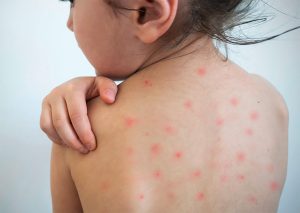Measles case reported in DuPage
Chronicle Media — April 23, 2024
Measles symptoms include a red rash, fever and cough. (Photo by National Library of Medicine/National Institutes of Health)
Measles appears to be making a stealthy comeback, including the first case in DuPage County in 15 years.
Declared eliminated in the United States in 2000 by the federal Centers for Disease Control, the highly contagious virus has had a reported 64 cases so far this year in Illinois and 121 nationally as of April 11.
Around 60 have been counted in Chicago, nearly half the nationwide count. Many were linked to new arrival shelters in the city, according to the DuPage County Health Department.
“DCHD is working diligently with public health partners to identify and notify individuals who may have been exposed to the virus,” the Health Department said in a statement. “No exposure locations have been identified in DuPage County.”
The Illinois Department of Public Health has also reported two cases in suburban Cook and Will counties and one additional case in Lake County.
Once a common childhood virus, measles was first reported in the United States in 1765 and killed around 6,000 people yearly early in the 20th century.
According to George Washington University’s Milken Institute of School of Public Health, the creation of a measles vaccine in 1963 and subsequent widespread and effective immunization led to a dramatic reduction and a declaration the disease’s elimination in 2000.
But since then, the GWU report stated that individual cases and outbreaks had returned, notably among unvaccinated individuals.
Children are required to have a series of vaccinations — including measles — before entering school. Illinois had reports of five measles cases in 2023, the first in the state since 2019 when the last cases were identified in Chicago.
According to the Chicago Department of Public Health, measles is a serious respiratory infection that causes a rash, cough, high fever and watery eyes and can lead to pneumonia and other complications. It is highly contagious to unvaccinated children and adults.
After exposure, symptoms appear seven to 14 days after contact with the virus and typically include high fever, cough, runny nose, and watery eyes, according to the Centers for Disease Control and Prevention. Measles rash appears three to five days after the first symptoms.
If infected, IDPH said treatment includes bed rest, lots of fluids and medicine for fever and headache. Antibiotics do not help — either to cure measles or to prevent it. There are no anti-viral drugs for treating measles.
Doctors recommend that most children get the first dose of the MMR (measles, mumps and rubella) vaccine at the age of 12 to 15 months and a second dose at 4 to 6 years of age. MMR vaccine is available at most doctor’s offices and pharmacies. Illinois children as young as 7 years-old can get vaccinated at pharmacies under Illinois law.
Measles information is available at cdc.gov/measles/index.html as well as the Illinois Department of Public Health at https://dph.illinois.gov/.
In the meantime, DuPage health officials encourage residents to keep up to date on vaccinations.
“With an increasing number of measles cases being identified, being up to date with measles-mumps-rubella (MMR) vaccinations is the best way to protect yourself and your loved ones,” said Adam Forker, Executive Director, DuPage County Health Department in a statement. “Measles is highly contagious but thankfully, the MMR vaccine is effective at preventing measles and remains by far the best protection against measles for people of all ages.”



